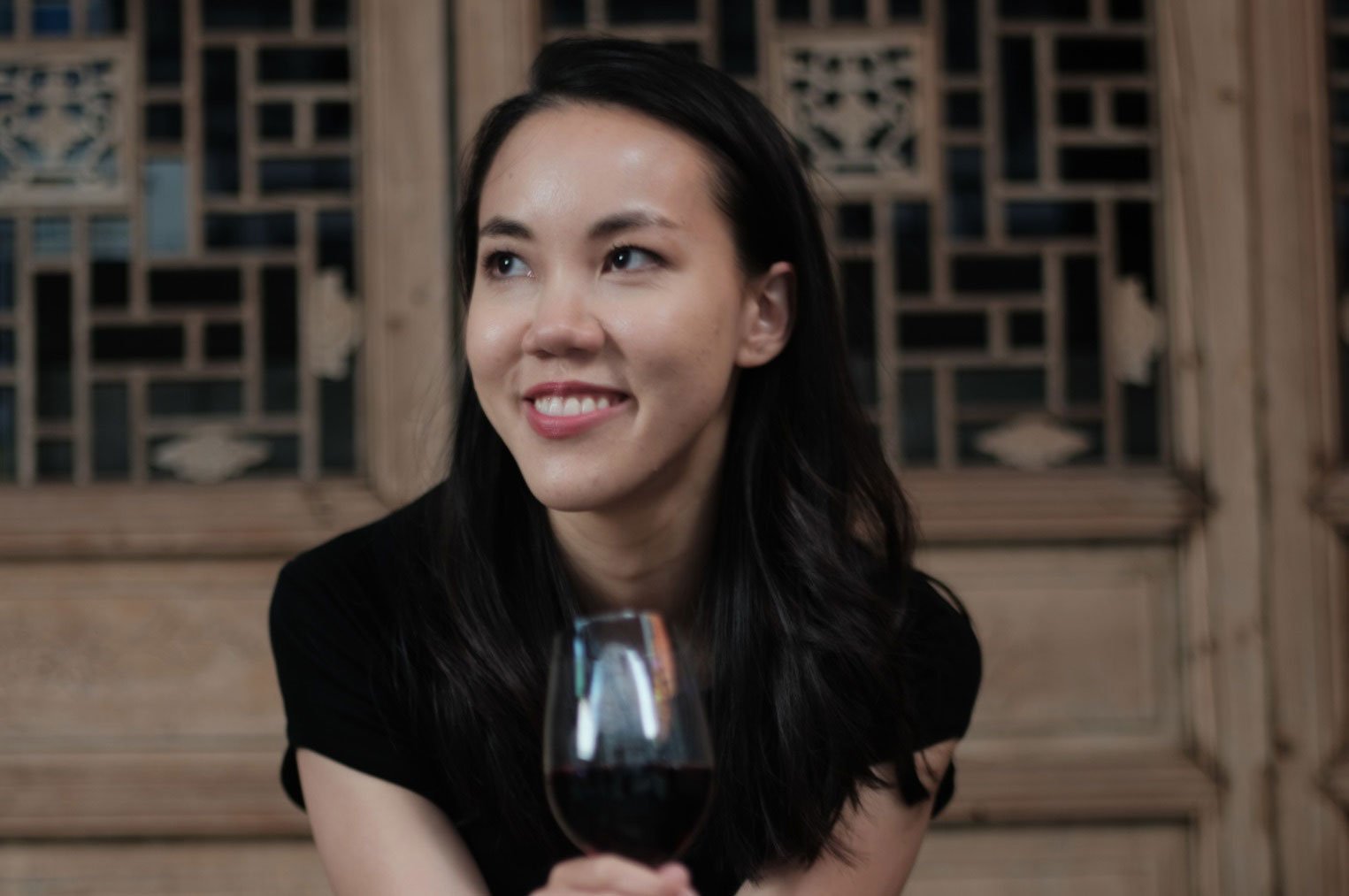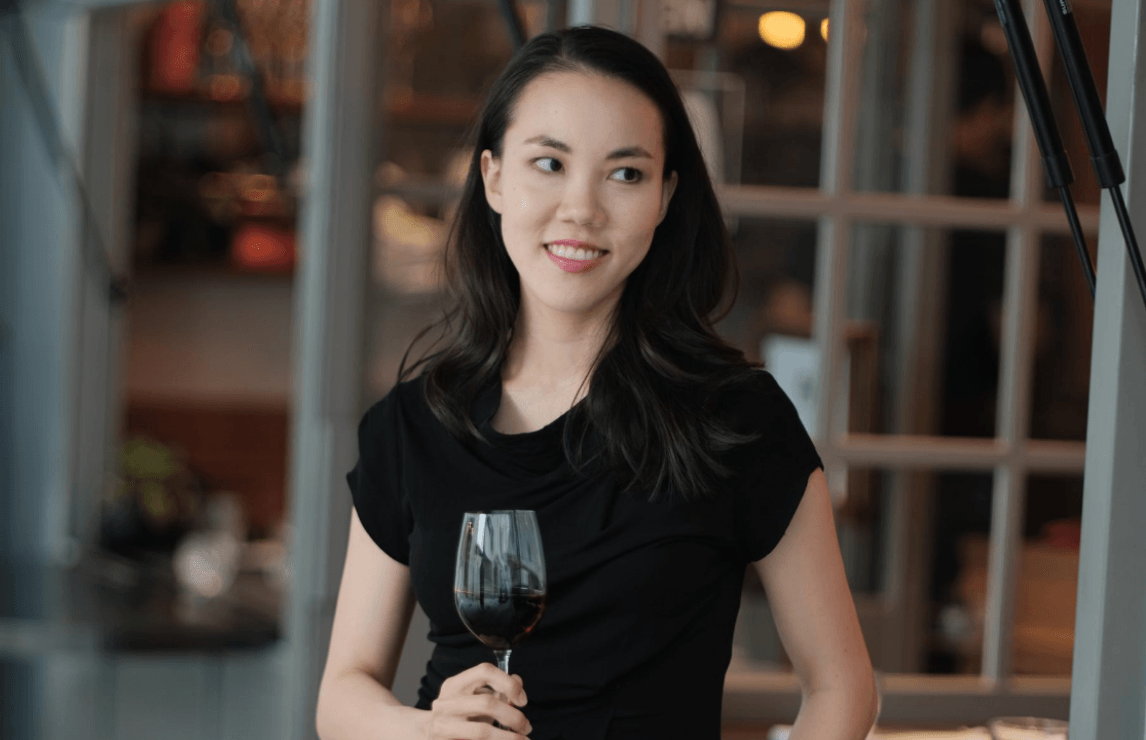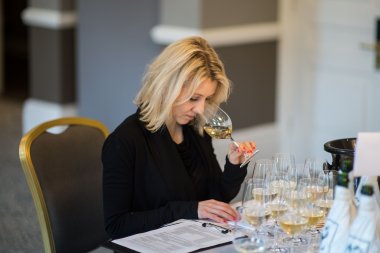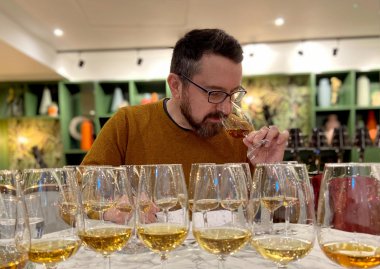IWSC Judges' Insight: Sarah Heller MW
Sarah Heller MW is a Master of Wine and visual artist based in Hong Kong, whose portfolio of projects targets the new generation of wine lovers in Asia. She is a brand ambassador and design collaborator for Lucaris Crystal; partner/buyer of the Almásy Collection of wines; wine editor for Asia Tatler; chairman of WINE100 and faculty of the Vinitaly International Academy. In 2019, she was named a member of the judging committee at the IWSC and became a columnist for Club Oenologique.
Where did you grow up?
I grew up in Hong Kong, went to university in the US, then unexpectedly ended up back in Hong Kong in 2010.
Where did you train?
I think of my wine “training” as a combination of rigorous formal education and somewhat haphazard professional experience. The work experience came first. My initial professional contact with wine was as an intern at a restaurant in Turin during time off from university. When I returned to my studies, I split my time between my art degree and interning at a New York City wine importer called Domaine Select where I helped out with marketing and, when a sales person would agree to let me tag along, sales. When I graduated, they sent me to intern at several wineries in their portfolio with the idea that I would join full-time afterwards, but part way through my first one I fell into a tank and fractured my spine, forcing me to return home to Hong Kong, where I soon found the wine industry was taking off.
At first I worked for a few different Italian wine importers in sales, but was soon disheartened by how little any of it seemed to have to do with wine. In New York, the sales calls involved a lot of tasting and talking about the wine; in Hong Kong back then, many buying decisions were being made by GMs or even accountants who weren’t interested in wine, sometimes without even tasting it.
I was also working part-time with Debra Meiburg, one of Asia's first MWs; we quickly hit it off and I soon started working for her full-time. Working for Debra was an incredible experience because at that point it was only really the two of us and we had a lot of ideas, energy and enthusiasm. We created a lot of really innovative wine education tools, events and media; a complete wine sales training course for a major travel retailer; a series of Asian trade guides that gave producers a straightforward resource for entering various Asian markets, etc. In 2014, I left to focus on my Master of Wine studies. Since leaving Meiburg Wine Media, I’ve been the buyer for two start-up wine brands, opened a pop up wine bar, designed wine labels, made television and video courses, and eventually settled on roughly five large, long-term projects that are ongoing.
Meanwhile, my formal wine education didn’t start until I came back to Hong Kong. At the time, I thought I knew quite a bit about wine but then one night I was at dinner with some local wine lovers and one of them — who'd been perfectly pleasant to me all evening — stood up to leave and said, “It’s been lovely speaking with you; you should really consider getting some formal wine education instead of talking all of this marketing b******t.” He subsequently became my WSET L3 teacher. I’ve always been pretty geeky, so after L3 I forged on through the Diploma. When I got into the MW programme, I was determined not to get stuck for years studying, so I made a conscious decision to treat it like a job, create a series of tasks and deadlines and hold myself accountable for meeting them. By far the most challenging aspect — as is the case for many students — was the tasting papers; the level of physical discipline required to prepare for those papers is the toughest training I’ve experienced.
Who was your greatest influence?
Debra Meiburg MW empowered me to believe that I could forge my own path in the wine industry and that you don’t need to follow a pre-determined route if you're willing to take responsibility for your own learning.
Stevie Kim has shown me how much you can achieve when you surround yourself with quality people, set your sights on big, ambitious targets and get comfortable with the idea of temporary failure in the service of ultimate success.
What inspired you to join the wine industry?
I was obsessed with wine and how much there is to learn about it and I loved the generous, convivial nature of the industry. I always assumed I would continue to make art — a very solitary activity — while working in the wine industry, and hoped the two would balance each other out. What kept me interested was the fact that there are so many facets to the industry and it gave me scope to constantly develop and use new skills. 
What was your greatest challenge and how did you overcome it?
A major challenge was being taken seriously and earning enough money between my projects to be able to justify staying in the industry. When I was studying, so many people would try to take advantage of me by offering me the privilege of working on their project because it would be “great exposure for me.” It was often really tough, because sometimes the experience you gain does end up being more valuable than any money you could have made, but I learned over time to tell a good opportunity from a mediocre one and suppress the FOMO. In reality, it’s very rare that passing up one (unpaid) opportunity is going to ruin your career. I’ve also been incredibly fortunate that the Master of Wine is so valued in our part of the world that since I achieved the title this hasn’t been a major issue.
What is your greatest achievement?
The Master of Wine required a great deal of dedication, love and work, and I’m deeply proud of having achieved it, but on some level I’m even more proud of the work I’ve done in the past few years and having found a way to combine my two loves: art and wine. This work includes my Visual Tasting Notes art series and my new glassware range with Lucaris Crystal, which is inspired by that series. I’m uniquely proud of these projects because they feel like a complete expression of who I am and my contribution to both fields.
Is there anything that you would do differently?
I do often wish I’d gotten more first-hand winemaking experience, but I also don’t really believe in second-guessing yourself. Things that seem like a mistake or a disaster at the time — falling into a tank, for instance — can later turn out to have been a stroke of good fortune.
What advice do you have for someone joining the wine industry?
Loving wine isn’t a great reason to join the industry. I constantly meet people in corporate jobs who are toying with joining the wine industry and I have to remind them that there are so many people willing to work in wine that competition is fierce, salaries are nothing like what they’re currently paid (running a business can be even tougher) and the work is far less glamorous than everybody imagines.
Because our wine trade is still comparatively young compared to the US and especially the UK, a lot of people here want to open their own business. I know if I had gone straight into running my own business without having the experience of working with Debra first, I would have made a lot of mistakes from which I might not have recovered (I made enough as it is). Wine is such a vast subject that you can’t even know before you start what you don’t know, so getting a combination of formal education and work experience in other businesses is essential before you strike out on your own.
Most people don’t spend anywhere near enough time considering the logistical and legal side of the wine business; it’s not glamorous and it's very complex but it will bury you if you don’t work it out ahead of time. For instance, I can’t tell you how many people export their wine to China without registering their trademark in their own language and Chinese characters. They are literally exposing themselves and their importers to criminal charges if somebody else has registered their brand already.
What advice do you have for a producer wanting to get their wine in front of you?
Please take a genuine interest in who I am and the publications I write for. For instance, Asia Tatler is a luxury and society magazine, so as much as I like to stretch the boundaries of that category and write about unusual wines, I’m highly unlikely to ever do a story about blue wine, so please don’t pitch it to me. I always pay extra attention to the people who write me and mention that they’ve read something I’ve written and explain how their wine might fit into a story.
Avoid resorting to hyperbole; “XXX is the most important and historical grape of Italy,” or “XXX is the most acclaimed and awarded producer in Spain” — it probably isn’t true and it sounds self-aggrandizing and silly.
Please be as respectful of me and my culture as you would like me to be of yours — being based in Asia, I can’t tell you how many producers have made remarks like “this wine is sweet and fruity so it goes well with Asian food,” but would go berserk if somebody confused a baguette with a ciabatta. Spend an extra 15 minutes researching the type of food that’s available where I live and try referring to those dishes (even if I think the match is improbable, I’ll appreciate that you spent the time).
What is more important, passion or knowledge?
After debating back and forth with myself, they’re obviously both important but passion is something you can’t easily acquire if you don’t already have it. So, if I were hiring somebody for the long term, I’d want somebody passionate but if I were hiring somebody for a short-term project, I’d probably prefer somebody knowledgeable.




